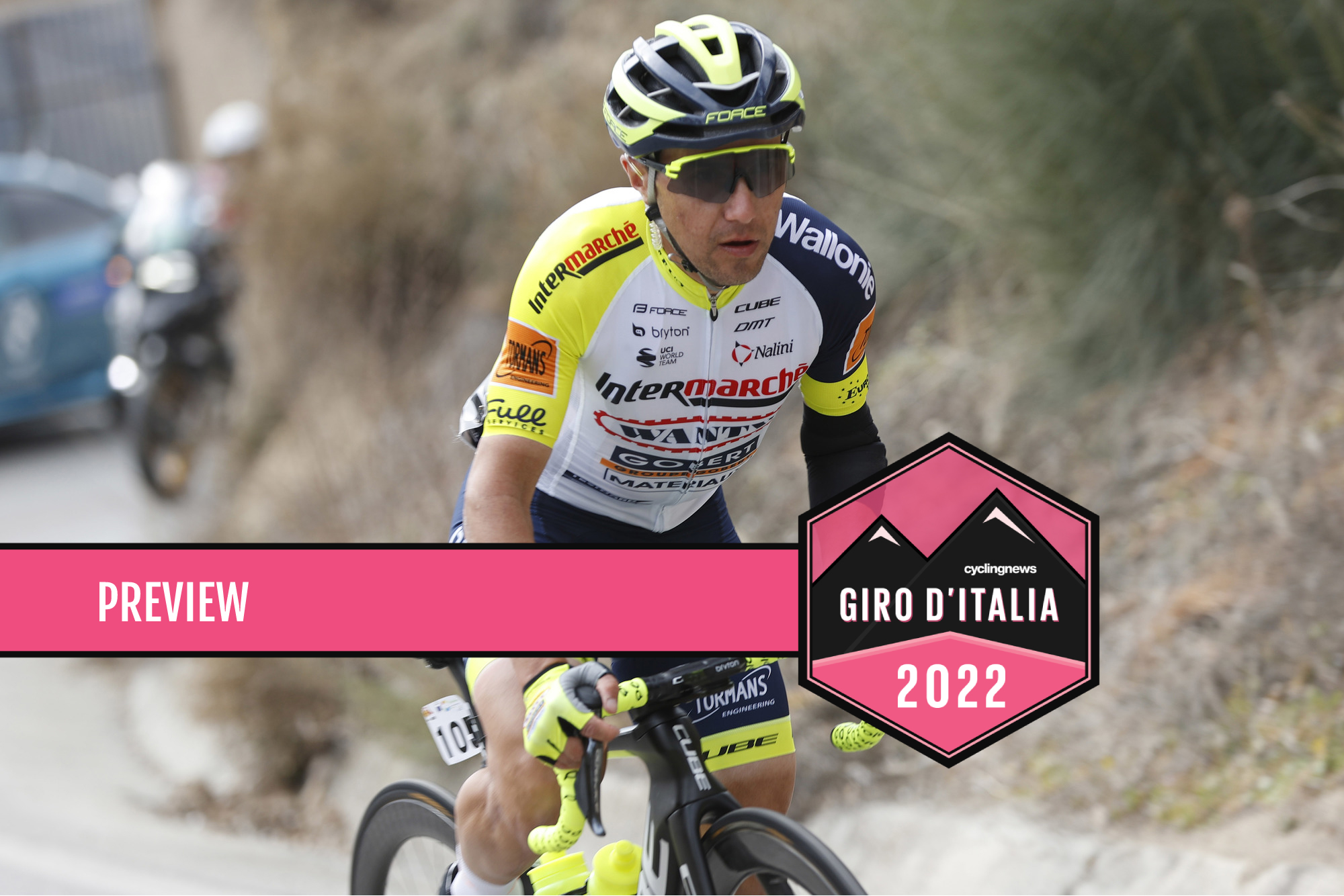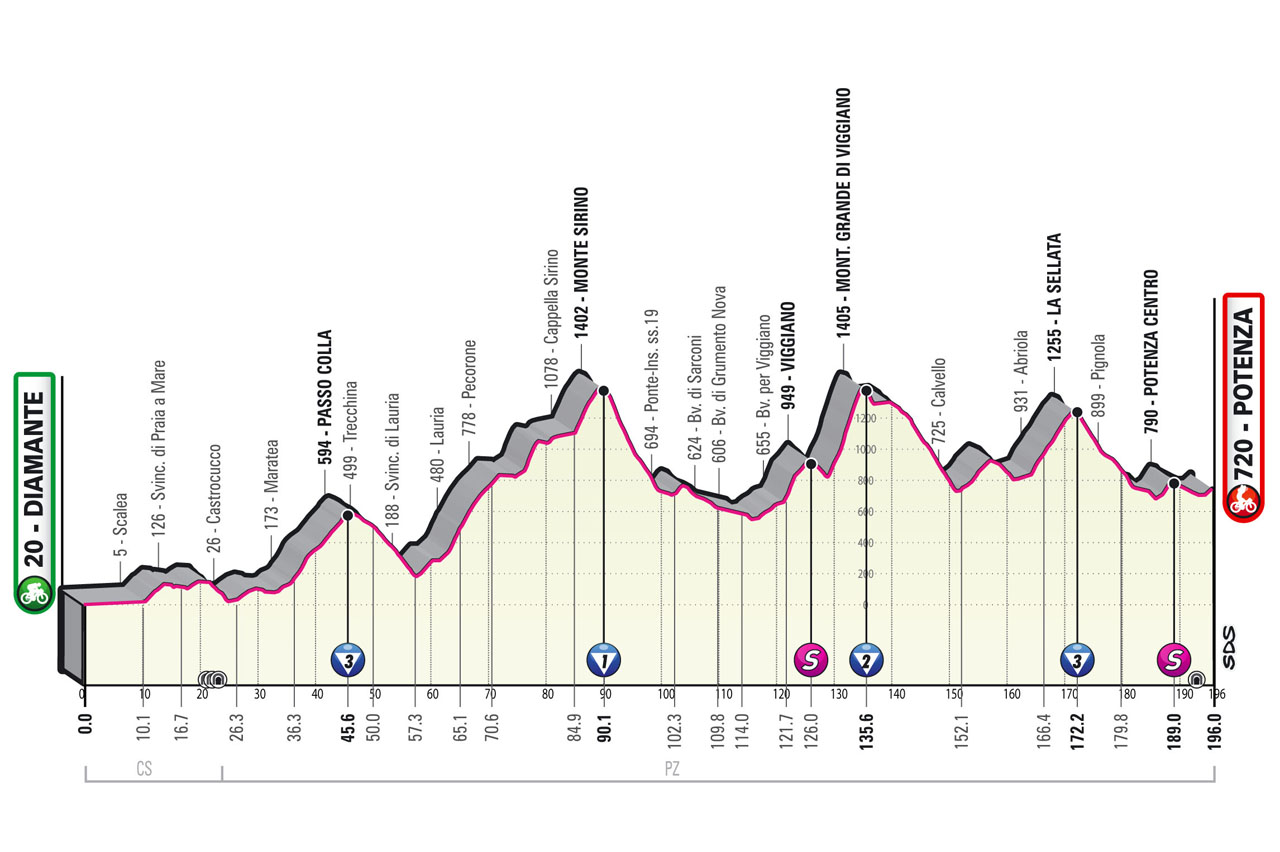Domenico Pozzovivo: Giro d'Italia's rugged road to Potenza could spring surprises
Italian relishes rare mountainous day in native Basilicata

When Domenico Pozzovivo was left without a team at the end of last season following the demise of Qhubeka-NextHash, he had one thought to sustain him through that dark winter: a sunny day amid the hills of his native Basilicata, with fresh tarmac beneath his wheels and his home fans cheering from the roadside.
That day arrives on Friday. When the Giro d’Italia reaches Potenza on the deceptively-demanding stage 7, Pozzovivo will be in the gruppo, but in the opening weeks of this year, the thought seemed fanciful. Until Intermarché-Wanty-Gobert threw him a lifeline in February, the 39-year-old from Montalbano Jonico feared his career had ended.
“One of the big motivations I had to keep going this year was that I wanted to ride the Giro, because it doesn’t happen very often that it has a mountain stage in Basilicata,” Pozzovivo told Cyclingnews.
“As the months went by, however, I had less and less faith, and I certainly had a complicated period in January, when I really thought I was going to have to end my career. It felt even worse after doing so much work all winter long.
“I was glad to find a team, but it happened late, so that meant that I also had to make changes of material very late on. It took a while to get everything sorted out and dialled in.”
Pozzovivo lies 20th overall as the Giro approaches his home region, 2:37 down on maglia rosa Juan Pedro López (Trek-Segafredo). The veteran would be closer had he not conceded 20 seconds or so the group of favourites on the upper slopes of Mount Etna. While men like Vincenzo Nibali and Tom Dumoulin were undone by the steep slopes further down the climb, Pozzovivo was caught out in the wind on the exposed approach to the finish.
“It’s a pity because I lost the seconds more because of the wind than the climb itself. When we turned that corner onto the bigger road with 1.5km to go, we went into an echelon and I lost the wheel,” Pozzovivo said.
Get The Leadout Newsletter
The latest race content, interviews, features, reviews and expert buying guides, direct to your inbox!
“It was hard to get back on, but the gaps are small and I’m still where I wanted to be. I have to say that I never really felt on the limit during the climb. I didn’t feel great, but I wasn’t too worried about being dropped.”
Viggiano

Friday’s 196km haul from Diamante to Potenza brings the race over the rugged interior of Calabria and Basilicata, climbing by way of the category 3 Passo Colla, the category 1 Monte Sirino, the category 2 Montagna Grande di Viggiano and the category 3 Sellata, which comes 24km from the line.
“I think it’s a very hard stage. It’s maybe not a stage where the GC will change much and it’s probably a day for the break because there are already a lot of riders who have lost a lot of time,” Pozzovivo said. “But it’s still a stage that could spring some surprises, especially with the penultimate climb.
“The last classified climb is very hard, and if somebody wants to attack there, they could really make the difference. And before that, the climb over Viggiano is really tough, it’s one of the most demanding of the Giro. It shouldn’t be underestimated.”
Pozzovivo, now resident in Lugano but a native of the Val d’Agri, grew up training on these very roads, even if he imagines – or at least hopes – that they will feel a little different on Friday. A visit from the Giro has the happy side-effect of releasing funds for much-needed repair work.
“I haven’t done it all in one training ride, but I’ve been up all of those climbs at one point or another, so I know them all,” Pozzovivo said. “The biggest problem – at least until the Giro turns up and they lay down fresh tarmac – is the surface of the roads. But I’m sure that for the Giro they’ll have sorted all that out.”
While his friend, contemporary and neighbour Nibali has confirmed his retirement at the end of this season, Pozzovivo has not yet made any definitive plans for his future. This may well prove his final chance to ride the Giro on the roads of his youth, but it might not necessarily be his last appearance in the race.
“I’m not putting an absolute deadline on this being my last Giro,” Pozzovivo said. “If my experience as a rider continues further, I’d be happy if it was with this team, but it’s still early to talk about it. I just hope it’s not an unlucky year like last year. That might give me more motivation to continue.”
Italy’s struggles to produce potential Giro winners have been well documented, but over the past decade, the home nation’s hopes have been carried primarily by southerners, such as Pozzovivo, the Sicilians Nibali and Damiano Caruso, the Sardinian Fabio Aru and, perhaps this year, the Abruzzese Giulio Ciccone.
But while their exploits may hint at a shift in the geography of Italian cycling, the road from the southern regions to the WorldTour is as rough and rugged as ever it was. In cycling as in society, the economic centre of gravity lies firmly in the north.
“Currently, there’s another pro from my region with excellent prospects, Alessandro Verre (Arkea-Samsic). So fortunately, if I have to retire, there’s another Basicilata rider who I think will be at my level in the future – or even better, I hope,” Pozzovivo said.
“But at juvenile level, unfortunately, there isn’t a lot of movement. We still need to bridge that gap that exists with the north of Italy. Italian cycling in general is suffering a lot at the moment, but southern cycling is suffering in particular.”

Barry Ryan was Head of Features at Cyclingnews. He has covered professional cycling since 2010, reporting from the Tour de France, Giro d’Italia and events from Argentina to Japan. His writing has appeared in The Independent, Procycling and Cycling Plus. He is the author of The Ascent: Sean Kelly, Stephen Roche and the Rise of Irish Cycling’s Golden Generation, published by Gill Books.